Recent Posts
Staying Warm This Winter: Safe Heating Tips for Texas Residents | SERVPRO of Temple & Belton
10/7/2024 (Permalink)
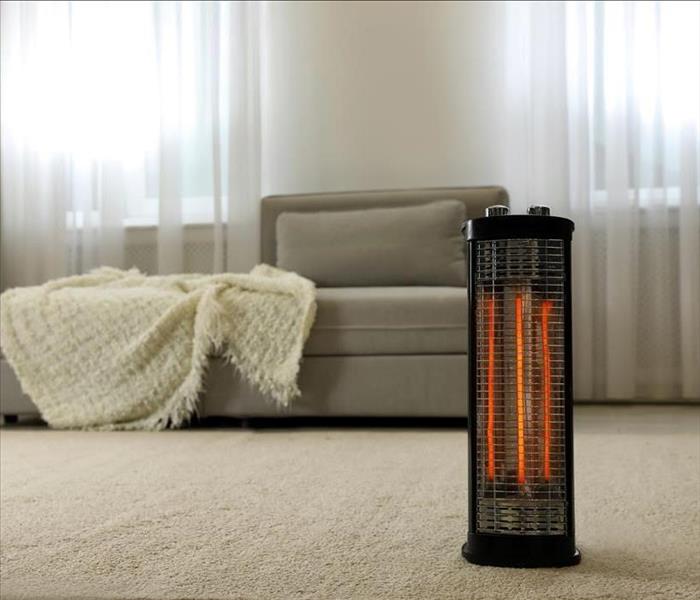 Stay warm and safe this winter with these helpful tips! Contact SERVPRO of Temple & Belton for fast fire restoration services.
Stay warm and safe this winter with these helpful tips! Contact SERVPRO of Temple & Belton for fast fire restoration services.
As winter settles across Texas, keeping your home warm and cozy becomes a top priority. While chilly temperatures can prompt many to crank up the heat, it’s essential to remember that safety should never take a back seat. Each year, numerous home fires are reported due to improper heating practices.
At SERVPRO of Temple & Belton, we want to help you stay warm without increasing your risk of fire. Here are some effective ways to maintain comfort in your home during the colder months while ensuring your safety.
Optimize Your Home's Insulation
One of the most effective ways to keep your home warm is to improve its insulation. Proper insulation not only helps maintain a comfortable temperature but also reduces the need for excessive heating. Start by checking for drafts around windows and doors, as these can significantly contribute to heat loss.
Use weatherstripping or caulk to seal any gaps. Additionally, consider adding insulation to your attic, walls, and crawl spaces to further enhance your home's thermal efficiency. By optimizing your insulation, you can keep your home warm while relying less on heating devices that could pose a fire risk.
Choose Safe Heating Alternatives
If you’re looking for ways to heat your home safely, consider alternatives to traditional heating methods. Electric space heaters are popular, but it’s crucial to use them responsibly. Always follow the manufacturer's instructions, and never leave a space heater unattended. Place it on a stable, flat surface away from flammable materials such as curtains, bedding, and furniture.
Alternatively, you might consider investing in a wood or pellet stove, which can be an efficient way to heat your space. Just ensure that your chimney is clean and properly maintained to prevent creosote buildup, which can lead to chimney fires. Whatever option you choose, be mindful of safety precautions to minimize any fire risk.
Maintain Your Heating Systems
Regular maintenance of your heating systems is key to preventing fires and ensuring they operate efficiently. Schedule a professional inspection for your furnace or heating system before the winter season begins. A technician can identify potential issues and ensure that your system is functioning safely. For those who use fireplaces, make sure to have them inspected and cleaned at least once a year. Keep the area around your fireplace clear of combustible materials, and always use a screen to catch embers.
Additionally, remember to test your smoke detectors monthly and replace batteries as needed. These proactive measures will not only keep you warm but also provide peace of mind knowing you’ve reduced the risk of fire.
As the temperatures drop this winter, staying warm is essential, but so is ensuring the safety of your home and family. By optimizing your insulation, choosing safe heating alternatives, and maintaining your heating systems, you can create a comfortable living environment without increasing your fire risk.
At SERVPRO of Temple & Belton, we understand the importance of safety during winter months. If you do experience any fire-related emergencies or need assistance with restoration, our team is ready to help.
Top Tips for Recovery From a Flood | SERVPRO of Temple & Belton
8/27/2024 (Permalink)
 Living room filled with flood water
Living room filled with flood water
No matter what season we are in here in the Temple area, flooding concerns are always a possibility. In fact, our community is considered part of “Flash Flood Alley,” which is a thin strip of land that runs right through central Texas.
We experience a higher number of flash floods or flooding issues than other parts of the country, so it is important to know what to do if a flash flood warning is issued for our area.
Flooding situations are overwhelming no matter what, which is why our flood restoration team explains more below about what to do when water starts rushing into your home.
Your Family’s Safety
Flash flood warnings can be issued at any time, even if the storm hasn’t come to town yet or if it is not actively raining in your neighborhood. You should start preparing as soon as the alert is issued so you aren’t scrambling as soon as the rain begins to fall. Head for home if you aren’t already there but avoid any roads that you know tend to flood quickly.
Quickly tie down anything that has the potential to be swept away, like your lawn furniture or grills, and get your car into the garage. If your home is known to flood, consider turning off the electricity to your lowest levels just to be on the safe side. Locate your emergency kit and find a safe spot on a higher level of your home to wait out the storm.
What to Do After the Rain Stops
Stay calm if water starts rushing into your house. There really isn’t much you can do in the moment, and you simply just have to wait until the conditions are safer to take action.
Once the water stops flowing in, move cautiously around your house since water can do a lot of structural damage in a short amount of time. Wear sturdy boots if you have to walk through any water as sharp objects or hazardous substances could be lurking in the water.
Once you have assessed the damage and assured yourself that your family and loved ones are safe, give us a call. Our team will start creating a personalized restoration plan right away. We will ask you to take as many images of the damage as possible, as this will help us with our plans and also help make your insurance claim process much smoother.
How We Dry Up Flood Water
Our first goal is to remove the excess water because we know that the longer water or residual moisture lingers, the worse the situation can get. Our air movers, blowers and other water extraction equipment will remove the water, and we will also get to work saving your fragile possessions and keepsakes. We pride ourselves on our restore rather than replace mentality, and we work hard to save whatever we are able to.
Once the water is gone and your home is secure once more, we can turn our attention to any necessary repairs. Water can instantly warp walls, floors and ceilings and it can also spark mold growth or mildew.
We will restore everything that was damaged, and we will sanitize your space to make sure a mold colony will not be able to grow. We will do whatever it takes to help you recover faster after you suffer a flood disaster.
Standing water in your home should always be cleaned up fast. Contact SERVPRO® of Temple & Belton right away.
We’ll Takes Care of Your Business | SERVPRO® of Temple & Belton
3/22/2024 (Permalink)
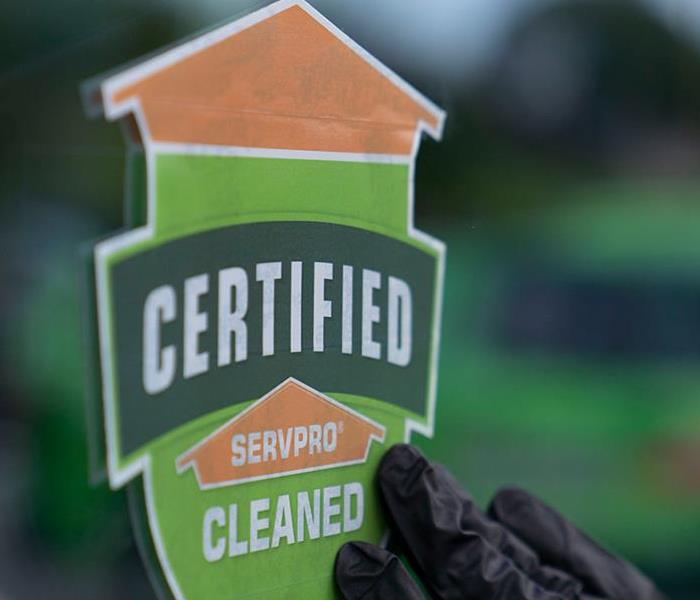 SERVPRO sticker on window
SERVPRO sticker on window
We know that our community wouldn’t be half as great without the amazing businesses that keep us fed, comfortable and entertained in the Temple and Belton area. We have a lot to be grateful for! We also know just how much work it takes to run a successful business and that you have to wear a lot of hats to keep things running.
It can be exhausting thinking of all of the things you have to do on a daily, weekly and monthly basis! Thankfully, you don’t have to do everything on your own. SERVPRO® of Temple & Belton proudly offers our restoration and cleaning services to the commercial properties and businesses in the area.
Our Emergency Restoration Services
While it may seem like you are prepared for any number of disasters, thanks to your extensive planning and training. However, situations can take you by surprise at any point! Flooded basements, fire damage in the break room or a destroyed roof due to a fallen tree in a heavy storm can leave behind extensive damage and a lot of questions for your staff and customers.
Our team is trained in large loss recovery, and we can quickly get your business restored. We know that every minute that you are closed can affect your bottom line, so we do whatever we need to do in order to help you recover.
We have worked with all kinds of properties, including universities, office spaces and hospitals, as well as small family businesses. We will put as much attention and detail into the smaller projects as well as the larger ones.
Our Cleaning Services
We would bet you didn’t start your business or become the manager just to dedicate your spare time to cleaning, but those projects are vital to keeping your space sparkling and healthy for your employees and customers. Let our team take over these duties for you!
We can handle any sort of specialized deep-cleaning needs that you have as well as routine cleanings like duct work, carpet cleaning or even odor removal. We have the tools and specialized equipment to ensure your space is spick and span in a short amount of time.
Biohazards and Reconstruction
Sometimes the unexpected can take us by surprise, but other times it can lead to something more serious or even dangerous on your property. Our biohazard team is trained to handle any sort of biohazard situation on your property. We can do everything from tackling a sewage leak to cleaning up after a trauma or crime scene.
On the other end of the spectrum, we can also help you finally tackle that addition that you have been dreaming of. We have a full-service construction crew that can help you build or reconstruct any part of your building or property. If you dream it up, we can make it come to life.
Our local businesses are what make our community great! Contact SERVPRO of Temple & Belton today to schedule one of our commercial services.
Key Areas in Your Home Where Water Damage Is Common | SERVPRO® of Temple & Belton
12/4/2023 (Permalink)
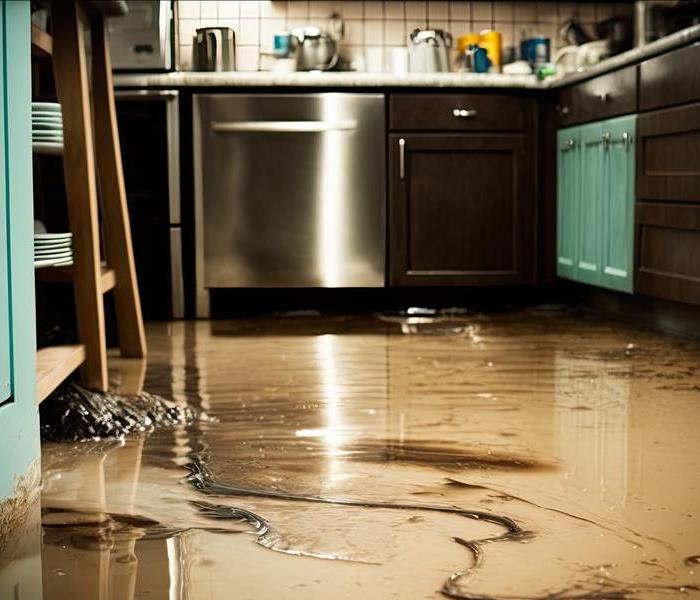 Flooded kitchen floor, water leaking. Closeup view of a waterlogged kitchen floor.
Flooded kitchen floor, water leaking. Closeup view of a waterlogged kitchen floor.
Chances are that you don’t give much thought to your water pipes or gutter system on a daily basis. You rely on them to keep water flowing through and around your home in a controlled way, and most of the time, they do!
However, one single malfunction or issue could cause all kinds of water issues for your home. Burst pipes, overloaded gutters and faulty appliances are all at risk of causing extensive water damage in a short amount of time.
By understanding where water damage is more likely to occur, you can take steps to address any emerging issues right away and minimize your situation. Our SERVPRO of Temple & Belton team explains more below, so read on to learn all about water damage in our homes.
Appliances and Pipes
The risk of a water leak is present wherever water is being used in your home. Dishwashers, water heaters and washing machines all have the potential to malfunction and leak. Keeping up on routine maintenance and checking around each appliance for water spots or signs of damage often can help you stop an emerging problem right away.
Your pipes are also vulnerable to wear and tear. Check the lines coming to and from your sinks, tubs and toilets and replace any old caulking or seals that you notice are starting to age. A single small crack in a fitting or the pipe itself can either cause a huge water disaster in a single event or it can occur gradually over a long period of time.
The Damages Caused By Mother Nature
We all know how destructive storms can be in the Temple area. Severe weather can bring heavy rain that can overload clogged gutters or it can leak down into your foundation and into your basement.
This is why cleaning your gutters regularly is crucial! Clean gutters encourage water to move down and away from your home, and that can’t happen if leaves or other yard debris are clogging up your system.
Floods are also a concern for this area. If your home is located in a flood zone, consider grading your property so that the land angles away from your home. This can help water naturally flow away from your house. You should also consider investing in a sump pump to help keep any water from getting into your basement.
How SERVPRO Can Dry Your Home
No matter how the water damage occurred, it can be frustrating or even overwhelming to decide where to start. The best first step is to call our restoration team! We are trained in every sort of water damage situation imaginable, and we have the tools, equipment and safety training to handle your recovery from start to finish.
We will remove any excess water or moisture, locate the source of the leak or issue, repair any problems we encounter and handle your damage recovery. That may seem like a large undertaking, but not to us! We are experts in disaster recovery, and we will help return your home to its preloss condition as quickly as possible.
Water damage should always be taken seriously. Call us right away at SERVPRO of Temple & Belton.
Quick Tips for Fire Safety in the Kitchen | SERVPRO® of Temple & Belton
9/6/2023 (Permalink)
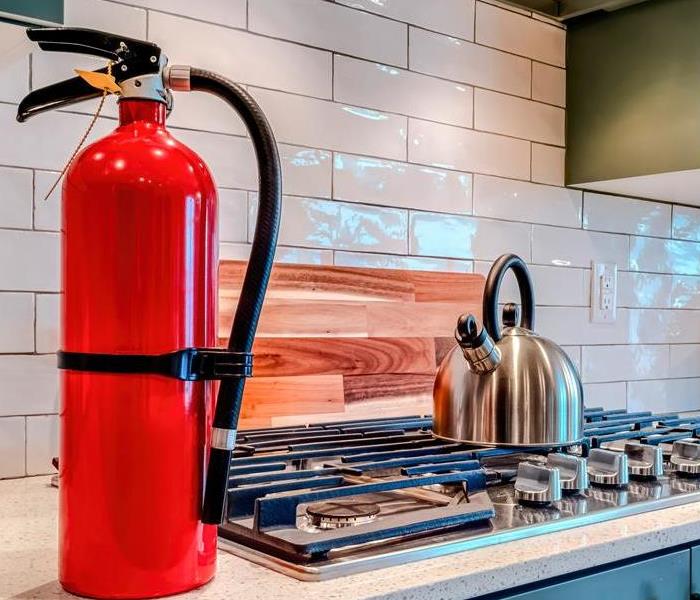 Fire extinguisher and cooktop with kettle on the countertop inside home kitchen
Fire extinguisher and cooktop with kettle on the countertop inside home kitchen
We all have our favorite recipes that we love to make, whether they are quick easy mac recipes or fully involved gourmet meals. Either way, we spend a lot of our time in the kitchen making food! It should be no surprise then that the majority of home fires are started in the kitchen.
Kitchen fires can get out of hand in seconds and cause extensive damage to your rooms or even to your entire home. Knowing what to do when a kitchen fire does break out can help stop the flames in their tracks and prevent widespread damage.
Our fire damage restoration team explains some easy ways to control any flames in your kitchen below, so check it out to learn more.
Smart Kitchen Tips
It only takes a few seconds for a kitchen fire to break out, which is why it is crucial that you stay near your heat source. The oven, stove or even the toaster can malfunction and start on fire when you step out for just a second to grab something.
You should keep a lid nearby for when you are cooking. If a spark or flame starts up in your pan, you can quickly throw the lid over it to smother the flames.
You should also take steps to reduce the amount of flammable materials in your kitchen. A wandering spark near a kitchen towel or a wooden spoon left too close to a burner is all it takes for a fire to catch and spread. Be sure to keep a fire extinguisher in your kitchen at all times for emergencies like this.
When a Fire Starts
If a fire does start and you are not able to put it out right away, back away and call 911. Fire can consume an entire room in minutes, and your safety is your top priority. If the fire is relatively contained, you can certainly stay to fight the fire quickly.
Just remember, water should never be used on a grease fire since water can disrupt the hot oil and cause an even bigger problem. Grease fires should always be smothered or put out with a fire extinguisher. If a fire starts in your oven, shut off the heat and DO NOT open the door. Keep it closed to shut off the oxygen supply.
Our Fire Damage Restoration Process
You extinguished the fire yourself or the fine men and women of the Temple or Belton Fire Departments did it for you. Now the reality of your situation may begin to set in and you might be overwhelmed by the damage in front of you. It’s time to call us to handle your entire restoration!
We will remove damaged debris, clean and sanitize your space, and we can tackle any and all repairs to get your home back to its preloss condition as fast as possible. We can even make sure all of the residual smoke odor has been removed from your home.
Kitchen fires can cause widespread damage in minutes. Contact SERVPRO® of Temple & Belton for a full recovery.
Everything You Need to Know About Dishwasher Leaks
7/14/2023 (Permalink)
A leaking dishwasher can quickly turn from a convenient appliance into a source of frustration and potential water damage in your home. In this blog, we will provide you with a comprehensive guide on dishwasher leaks. We'll explore the common causes behind dishwasher leaks, discuss preventive measures to avoid such incidents and guide you through the restoration process if you encounter a dishwasher leak in your home.
Causes of Dishwasher Leaks
Dishwasher leaks can occur due to various reasons. The most common causes include faulty door seals or gaskets, loose or damaged water supply hoses, clogged drain lines, and malfunctioning float switches or inlet valves. Additionally, overloading the dishwasher or using excessive detergent can lead to leaks by creating excess suds or causing excessive water pressure.
Preventing Dishwasher Leaks
Taking preventive measures can help you avoid the hassle and potential damage caused by dishwasher leaks. Regularly inspect the door seals and gaskets for any signs of wear or damage, and replace them promptly if needed. Ensure that the water supply and drain lines are securely connected and free from kinks or blockages. Avoid overloading the dishwasher and use the appropriate amount of detergent as per the manufacturer's recommendations. Performing regular maintenance, such as cleaning the filter and inspecting the spray arms, can also help prevent leaks.
Restoration Process for Dishwasher Leaks
If you experience a dishwasher leak, it's crucial to take immediate action to mitigate the damage. Start by shutting off the dishwasher's water supply and electricity. Carefully remove any standing water and dry the affected area to prevent further water damage or mold growth. Inspect the dishwasher components to identify the source of the leak and replace any damaged parts. Depending on the severity of the leak and resulting damage, you may need professional assistance for thorough cleanup, water extraction, and restoration of any affected surfaces or structures.
Understanding the causes of dishwasher leaks and implementing preventive measures can save you from the headache and expense of water damage in your home. Regular maintenance, prompt repair of faulty components, and proper usage practices are key to avoiding dishwasher leaks. However, if you do experience a dishwasher leak, acting quickly and seeking professional help for restoration can help minimize the damage and ensure your home is restored to its preloss condition.
Remember, if you encounter a dishwasher leak that is beyond your expertise to handle, it's best to contact a trusted disaster restoration professional, such as our SERVPRO of Temple & Belton team, who can provide specialized assistance and guidance throughout the restoration process.
How to Protect Your Business Before, During, and After a Storm
6/18/2023 (Permalink)
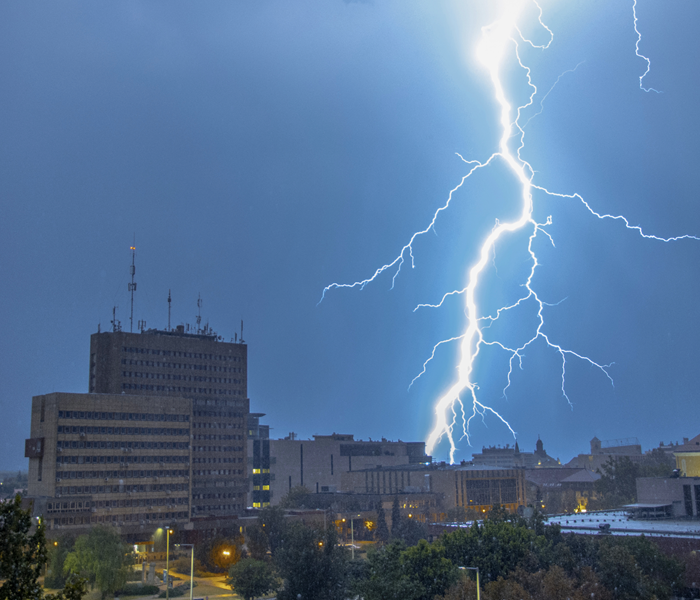 To minimize the impact of storms on your business, it is crucial to take proactive measures to protect your property,
To minimize the impact of storms on your business, it is crucial to take proactive measures to protect your property,
Natural disasters can cause significant damage to businesses, and storms are no exception. From strong winds to flooding, storms can cause severe damage that can impact your business's operations and financial stability. To minimize the impact of storms on your business, it is crucial to take proactive measures to protect your property before, during, and after a storm.
Before a Storm:
Develop an Emergency Plan: Developing an emergency plan is essential to protecting your business during a storm. The plan should include steps to protect employees, equipment, and inventory. Ensure that everyone is aware of the plan and conduct regular drills.
Secure Your Property: Secure all outdoor items and ensure that they are stored in a safe place. This includes outdoor furniture, signage, and anything that can be picked up by strong winds.
Backup Critical Data: Store all critical data and information in a secure location to avoid data loss in the event of a storm. Consider using cloud storage for easy access from any location.
During a Storm:
Follow the Emergency Plan: Follow the emergency plan you have developed and stay updated with the latest weather reports.
Protect Employees: Ensure that employees are safe and have access to emergency supplies such as food, water, and first aid kits.
Unplug Electronics: Unplug all electronic devices to prevent damage from power surges.
After a Storm:
Assess Damage: Once the storm has passed, assess the damage to your property and take photos of any damages.
Contact Your Insurance Company: Contact your insurance company immediately to report any damages to your property. Provide them with the necessary documentation, including photos and receipts.
Hire a Professional Restoration Company: Hire a professional restoration company, such as SERVPRO of Temple & Belton, to assess the damage and make the necessary repairs. They have the expertise and equipment to ensure that the job is done correctly and efficiently.
By taking these measures, you can protect your business from the damage caused by storms. Remember, it's always better to be prepared than to suffer the consequences of being caught off guard.
The Mold Remediation Process: A Step-by-Step Guide
5/14/2023 (Permalink)
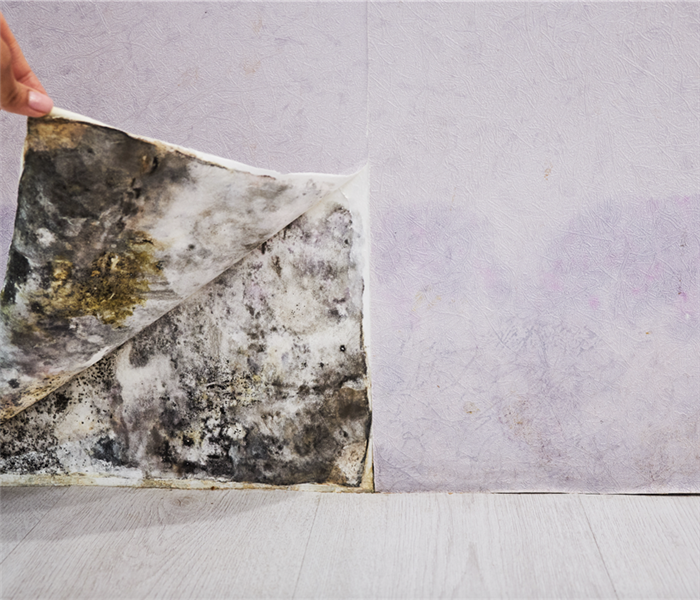 Each step is crucial to ensuring that the mold is completely removed and the area is safe for occupation.
Each step is crucial to ensuring that the mold is completely removed and the area is safe for occupation.
Mold remediation is the process of removing and cleaning up mold from an indoor environment. Mold can grow in many different areas of a building, and can be difficult to remove without professional help. The mold remediation process involves several steps to ensure that the mold is completely removed and the area is safe for occupation.
Step 1: Inspection and Assessment
The first step in the mold remediation process is inspection and assessment. A professional mold remediation specialist, like SERVPRO of Temple & Belton, will inspect the affected area to determine the extent of the mold growth and the cause of the moisture that allowed it to grow. They may use specialized equipment, such as moisture meters or infrared cameras, to identify the source of the moisture and locate any hidden mold growth.
Step 2: Containment
Once the extent of the mold growth has been identified, the next step is to contain the affected area. This is done to prevent the spread of mold spores to other areas of the building. The specialist will use barriers, such as plastic sheeting, to isolate the affected area and prevent mold spores from escaping.
Step 3: Removal of Mold-Contaminated Materials
The next step in the mold remediation process is to remove any mold-contaminated materials, such as drywall or carpeting. These materials cannot be cleaned and must be removed and disposed of properly. The specialist will use protective equipment, such as gloves and masks, to safely remove and dispose of the contaminated materials.
Step 4: Cleaning and Disinfection
Once the contaminated materials have been removed, the specialist will clean and disinfect the affected area. This involves using specialized equipment, such as HEPA vacuums and air scrubbers, to remove any remaining mold spores from the air. The area will then be cleaned and disinfected with antimicrobial agents to kill any remaining mold spores.
Step 5: Drying and Restoration
The final step in the mold remediation process is drying and restoration. The specialist will use specialized equipment, such as dehumidifiers and air movers, to dry out the affected area and prevent any remaining moisture from allowing the mold to return. Once the area is completely dry, any necessary repairs or restoration work can be completed to restore the area to its pre-mold condition.
Mold Remediation: A Comprehensive Process
In conclusion, mold remediation is a comprehensive process that involves several steps to ensure that the mold is completely removed and the area is safe for occupation. The process begins with inspection and assessment, followed by containment, removal of contaminated materials, cleaning and disinfection, and finally, drying and restoration. Each step is crucial to ensuring that the mold is completely removed and the area is safe for occupation. By understanding the mold remediation process, homeowners can take steps to prevent mold growth and address any mold problems in their homes.
Why Is My Fire Alarm Beeping? Common Reasons and Solutions
4/16/2023 (Permalink)
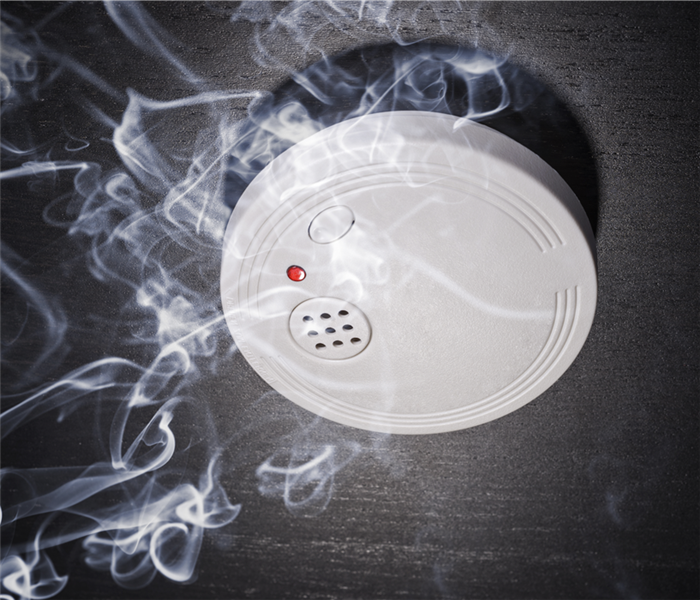 Here are some common reasons why your fire alarm might be beeping.
Here are some common reasons why your fire alarm might be beeping.
Your fire alarm is one of the most important safety features in your home, alerting you to potential danger and allowing you to take action quickly. However, if your fire alarm is beeping or chirping, it can be frustrating and even alarming. Here are some common reasons why your fire alarm might be beeping.
Low Battery
One of the most common reasons why fire alarms beep is due to low battery. Many fire alarms are designed to beep periodically to let you know that the battery is running low and needs to be replaced. If your fire alarm is beeping, check the battery and replace it if necessary.
End of Life
Just like batteries, fire alarms have a limited lifespan. Most fire alarms are designed to last for about 10 years. When a fire alarm reaches the end of its life, it will start beeping to let you know that it needs to be replaced.
Dust and Debris
Dust and debris can accumulate inside your fire alarm over time, causing it to beep or chirp. If you notice that your fire alarm is beeping and you've already replaced the battery, try cleaning it with a soft brush or compressed air to remove any dust or debris.
Humidity
High humidity can also cause fire alarms to beep. This is because moisture can get into the electronics of the fire alarm, causing it to malfunction. If your fire alarm is located in a humid area, try moving it to a dryer location.
Wiring Issues
If your fire alarm is hardwired into your home's electrical system, wiring issues can cause it to beep. This could be due to a loose connection or a problem with the electrical system itself. If you suspect that wiring issues are causing your fire alarm to beep, contact a licensed electrician to diagnose and fix the problem.
Smoke and Fire
Of course, the most obvious reason why your fire alarm might be beeping is due to smoke or fire. If your fire alarm is beeping continuously and there is no obvious reason, such as low battery or dust, it could be a sign of smoke or fire. In this case, evacuate your home immediately and call the fire department.
In conclusion, if your fire alarm is beeping, it's important to investigate the cause and take action as necessary. Common reasons for beeping include low battery, end of life, dust and debris, humidity, wiring issues, and smoke and fire. By addressing the cause of the beeping, you can ensure that your fire alarm is functioning properly and keeping you and your family safe.
Ways To Save Wet Documents, Books, And Photographs
3/18/2023 (Permalink)
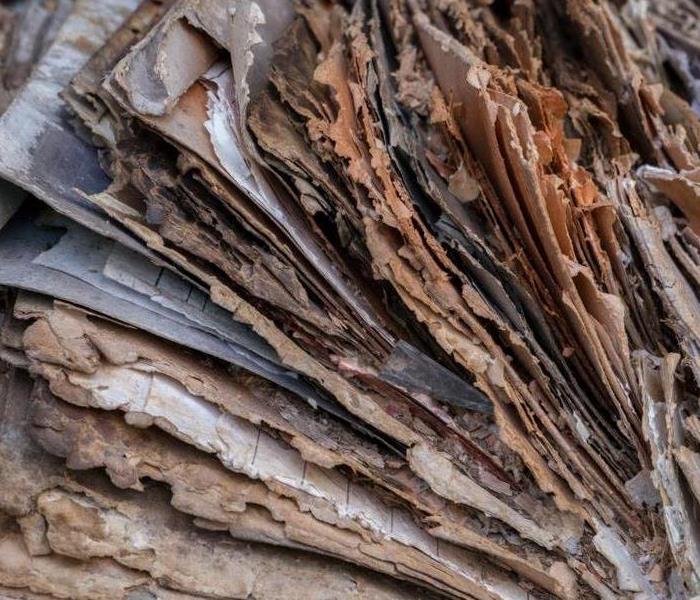 If your documents are damaged by water, give SERVPRO a call today.
If your documents are damaged by water, give SERVPRO a call today.
If you've ever had the unfortunate experience of a leak or flood in your home, you know that it can be devastating. Part of that experience can also include your documents, books, and photographs getting soaked. The best thing to do if this happens is to try and preserve the documents as best as possible. Here are some tips on how to salvage wet documents:
Wet Documents Need Attention Quickly
If you find yourself with wet documents, the first thing to do is to act quickly. If you don't and you wait too long, the document can be lost forever.
Your next step is to put your documents in a safe place where they can dry out completely. You also want to make sure that they are completely dry before putting them back into storage or filing cabinets so that mold growth doesn't occur again later on down the road!
Don't Use Heat
The most important thing to remember when you're trying to save wet documents is that heat can damage them. Heat can also help mold grow on your documents, which will make them unreadable and unusable. It's best if you can keep the documents cool instead.
Following a water damage event in your home or business, your attention will be needed in many different places at once. If you cannot focus your attention on saving wet documents at that moment, try freezing your documents! This will prevent any further damage, such as mold growth, from ruining your documents until you have the time to attend to them.
Air Dry
Place the documents on a dry surface. This can be a countertop, or even your kitchen table if you have enough room and it's not too messy. You want to make sure that they are far away from any sources of moisture or humidity, like windows or air conditioners.
Air drying is a good way to save wet documents because it doesn't require any special equipment or chemicals, but there are some drawbacks as well.
Air drying takes time--it may take days for all of the moisture in the document(s) to evaporate out through evaporation alone! If you have a lot of documents that need to air dry, it could also take up a ton of space. It is also time-consuming, as it requires consistent attention to ensure that the documents are drying properly.
Hire SERVPRO
The best thing you can do is to hire a professional restoration company like SERVPRO of Temple & Belton as soon as possible after the event occurs. They can begin drying out items as quickly as possible.
There are several reasons why it's important to hire professionals when dealing with wet documents. They have equipment designed specifically for drying out items like books and photographs (among others). This will ensure that they're dried properly without any damage being done in the process--and will save money down the line because these items won't need replacing due to mold growth or other issues caused by improper drying methods!
Digitize Documents
If you have wet documents, SERVPRO of Temple & Belton can help digitize your documents. We can scan the documents and save them to the cloud or print a copy for you. This way, even if your original is ruined by water damage, you will still have access to it!
Take Steps Immediately to Preserve Them
If you find out that your documents are wet, take steps immediately to preserve them. The longer you wait and the more water they absorb, the more damage is done to your papers. Most importantly, start drying them right away! This will prevent mold from forming, which will ruin your documents, books, and photographs.
 Stay warm and safe this winter with these helpful tips! Contact SERVPRO of Temple & Belton for fast fire restoration services.
Stay warm and safe this winter with these helpful tips! Contact SERVPRO of Temple & Belton for fast fire restoration services.



 24/7 Emergency Service
24/7 Emergency Service







